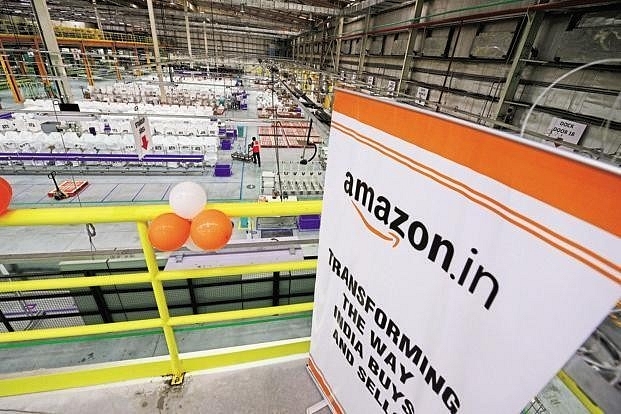
As Amazon Seeks Toehold In Future Retail, Ambani And Tatas Are Last Men Standing In Big Indian Retail
India may well be the Kurukshetra that will crush smaller players even as the global Godzillas do battle among themselves.
Will Ambani and Tata be the last Indians left standing in this battle?
With Amazon reported to be taking up a near 10 per cent stake in Kishore Biyani’s Future Retail, which owns the Big Bazaar and EasyDay franchises, it is now clear that the Indian retailing-cum-etailing market is going omnichannel in a big way. It is also going to be a very deep pockets game, with very little spaces left for the niche and bit players.
Earlier, Amazon and Samara Capital bought out Kumar Birla’s More retail business, and the former also took up stakes in Shoppers Stop and BankBazaar. Its rival, Walmart bought out Flipkart for $16 billion, while Chinese competitor Alibaba is already entrenched in BigBasket and Paytm Mall. It could be working behind-the-scenes on a tie-up with Reliance Retail.
Given the sheer scale on which Amazon, Walmart and Alibaba are planning their strategic investments, it is not unlikely that ultimately even Biyani may be vulnerable to a takeover offer, leaving only Reliance Retail and Tata Trent (Westside) as standalone Indian players.
Three major factors are observable in this consolidation.
One is, of course, the reality that one can no longer remain only a brick-and-mortar or purely online retailer. You have to be both. The buzzword for some time has been omnichannel marketing, which suggests that you have to reach the customer through any channel that is convenient to her, and through a route that is also cost-effective for you. In the Indian context, where logistics costs are high due to poor road and delivery infrastructure, it sometimes makes a lot of sense to ask customers to pick up deliveries of their online purchases from physical retail shops at a time of their choosing. It also makes sense to allow physical retailers to serve as touch-and-feel centres for products that are better sold directly, and/or ultimately sold on price through online stores.
Second, the new business model of omnichannel retailing is intrinsically investment-intensive, and no one in India has that kind of deep pockets, barring an Ambani here or a Tata there. Even a Birla had to sell his More chain, and merge his telecom venture with Vodafone, while the Tatas had to exit telecom altogether. Sunil Mittal of Bharti had to sell his retail chain to Biyani in order to find money to reinvest in his telecom business, and if Reliance Retail is seeking a possible Alibaba partnership, it is because even an Ambani can’t fund two cash-guzzling businesses (telecom and retail) entirely through profits from the refining and petrochemicals business. Sooner than later, we will probably see only two Indian promoters standing in the retail game, Ambani and Tatas (assuming their plans pay off). Biyani, who has been on a consolidations-spree in brick-and-mortar retail (he bought Hypercity, Nilgiris and Heritage Foods in quick succession apart from Bharti Retail), will ultimately have to connect his business to an online powerhouse.
Three, the real battle is between the big bucks US tech giants (Amazon, Google) and the Chinese behemoths, Alibaba and Tencent, with Japanese investors like SoftBank joining the funding mela. Even assuming the Tatas and Reliance manage to hold on to their turfs and expand them in India, there is little doubt that other Indian promoters will have to choose profitable niches to operate from, or serve as foot-soldiers doing battle on behalf of the foreign players.
Four, there is also a trend towards big retail seeking to get into digital finance, financial products and entertainment, as Amazon’s investment in BankBazaar and Alibaba’s in Paytm shows. Meanwhile, Reliance’s strategy against the giants of platform technology seems to be about controlling a large chunk of the pipes that enter your home. Apart from huge investments in Jio, it is buying up last-mile digital and cable services companies like Hathway and Den Networks.
There is very little time for the Indian government to put in place a framework for helping Indian promoters to retain their shareholding edge, assuming it is not too late already. Very few big retail companies are now owned by Indian promoters.
India may well be the Kurukshetra that will crush smaller players even as the global Godzillas do battle among themselves. Will Ambani and Tata be the last Indians left standing in this battle?